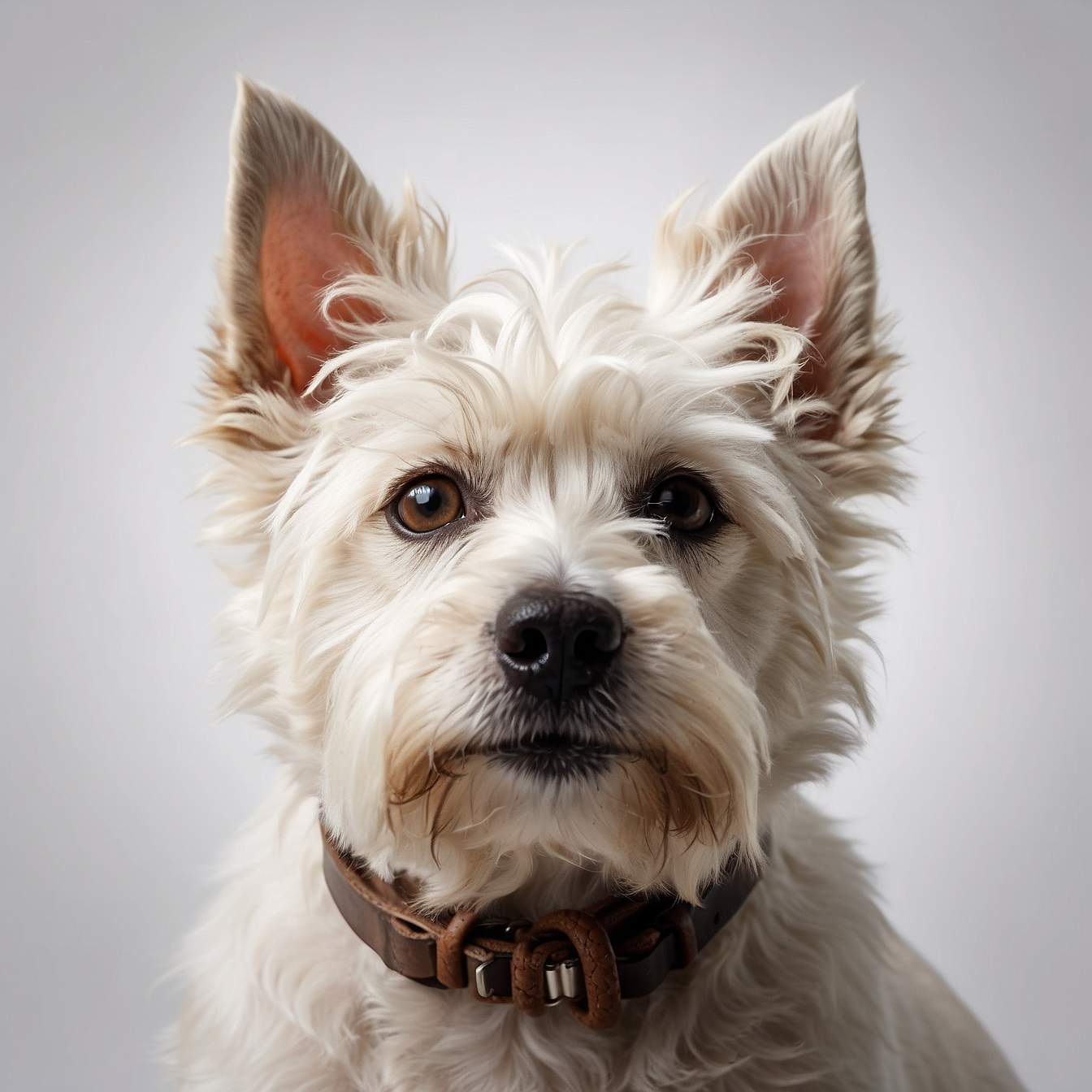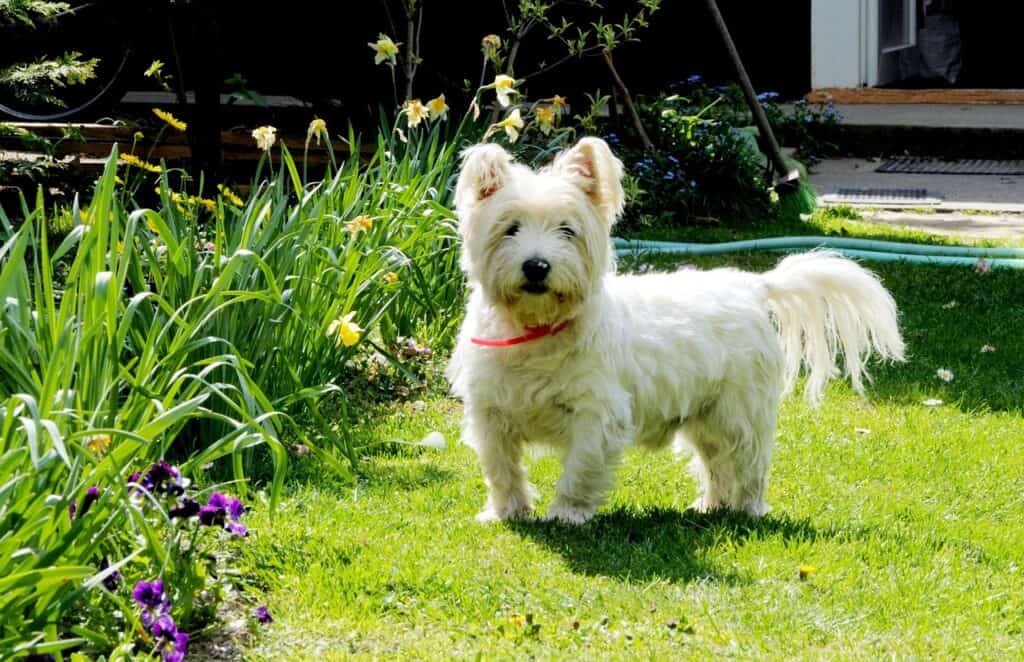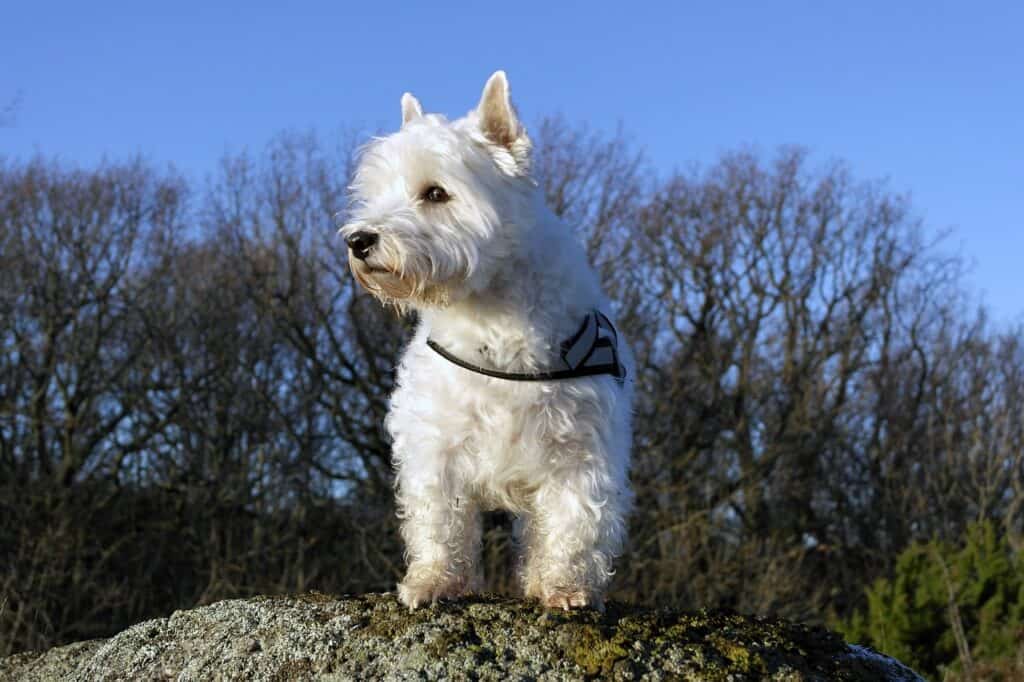The West Highland White Terrier, or Westie, is a bundle of pure, white joy. These spirited little dogs have a history that traces back to the rugged Highlands of Scotland. Dive into their world, understand their unique care requirements, and appreciate the bold and outgoing nature that makes Westies such delightful companions.

| ategory (Explanation) | Breed Information |
|---|---|
| Year of Breed Conception | 19th century |
| Country of Origin | Scotland |
| Weight (lbs & kg) (Male) | 15-22 lbs (7-10 kg) |
| Weight (lbs & kg) (Female) | 13-16 lbs (6-7 kg) |
| Coat Type | Double coat, straight and wiry outer coat |
| Color Variations | White |
| Shedding Level (Low, Moderate, High) | Moderate |
| Height (cm & in) | 10-11 inches (25-28 cm) |
| Breed Size | Small |
| Trainability (Low, Moderate, High) | Moderate |
| Mental Needs (Low, Moderate, High) | Moderate |
| Intelligence Level (Low, Moderate, High) | High |
| Energy Level (Low, Moderate, High) | Moderate |
| Agility (Low, Moderate, High) | Moderate |
| Loyalty (Low, Moderate, High) | High |
| Playfulness (Low, Moderate, High) | Moderate |
| Exercise Needs | Regular exercise and playtime |
| Guarding Proficiency (Low, Moderate, High) | Low |
| Sociability with Children (Low, Moderate, High) | High |
| Barking Level (Low, Moderate, High) | Moderate |
| Digging Tendency (Low, Moderate, High) | Low |
| Destructive Behavior (Low, Moderate, High) | Low |
| Drooling Level (Low, Moderate, High) | Low |
| Obedience Level (Low, Moderate, High) | Moderate |
| Apartment Friendly (Yes/No) | Yes |
| Inherent Prey Drive | Moderate |
| Physical Risk to Others (Low, Moderate, High) | Low |
| Travel Fatality Risk (Low, Moderate, High) | Low |
| Allergen Potential | Low |
| Health Concerns (List of Common Health Concerns) | Craniomandibular Osteopathy (CMO), Patellar Luxation |
| Average Life Expectancy (Life Expectancy in Years) | 12-16 years |
Woof Mastery is reader supported and our articles may contain affiliate links.
Instead of running third party ads that we have no control of we only use links from high-quality companies we are directly partnered with. Making use of these links come at no cost to you our reader, and in many cases have the extra benefit of discounted rates or sign up bonuses.
If you’re interested you can read more about our affiliate policy here.
We appreciate your support and always insure that the products and services we recommend are high-quality, helpful and relevant to the subject at hand!
The West Highland White Terrier, often known as the Westie, has a history rooted in the rugged Highlands of Scotland. They were bred to hunt small game, and their white coat helped distinguish them from prey in the wild. Over the years, these spirited terriers earned a reputation for their outgoing and confident nature. The Westie’s popularity soared in the 20th century, becoming an iconic breed in the United States and beyond. Their charm and spirited personality make them cherished family pets and enduring symbols of Scottish heritage.

What makes the West Highland White Terrier, or Westie, special is its spirited and outgoing personality. These dogs are like white bundles of joy, with a history rooted in the rugged Highlands of Scotland. Their distinctive characteristics and unique care requirements ensure that Westies bring delight and vivacity to the lives of those who choose them as companions.
The West Highland White Terrier, often known as the Westie, hails from Scotland’s rugged terrain, and their traditional role was closely tied to their origins. These small but spirited dogs were originally bred to hunt small game, including foxes, badgers, and otters. Their distinctive white coat allowed them to stand out in the field and avoid being mistaken for prey. Westies’ keen hunting instincts and energetic nature made them excellent hunters. While they’ve transitioned to become cherished pets, their working heritage as skilled hunters remains a part of their legacy.
West Highland White Terriers, or Westies, have outgoing and friendly personalities. They are spirited and full of white joy. These terriers are known for their confident and bold nature. They can be affectionate and make great family pets. With proper training and socialization, they become lively and loving companions.
Westies are spirited and outgoing dogs. They are known for their friendly and confident personalities. While they can be good with children and other pets, they may retain some terrier stubbornness. Training and socialization are essential to ensure they exhibit their best traits. Their confidence can sometimes make them assertive, and they may need clear boundaries.
West Highland White Terriers, often called Westies, are small, energetic dogs with a distinctive all-white, double-layered coat that’s straight and harsh. They have a compact, well-balanced body with a level back and a short, straight tail. Westies have a keen and alert expression with small, dark eyes, erect ears, and a black nose. Their legs are short and muscular, and they have sturdy feet. Westies have a lively, confident gait and a friendly disposition, making them charming and affectionate companions.
West Highland White Terriers, or Westies, are instantly recognizable for their all-white coats. Their fur is dense, straight, and weather-resistant, and it gives them a distinct and charming appearance. Westies have a pure and bright white coat that helps them stand out in any setting.
West Highland White Terriers, often called Westies, have a characteristic white coat that is coarse, straight, and double-layered. Their white coat gives them their unmistakable, pristine appearance.
West Highland White Terriers, or Westies, have a moderate shedding level. These small terriers shed throughout the year, and regular grooming is necessary to manage their coat. Brushing the double coat a few times a week helps remove loose hair and prevents matting. Stripping or plucking may be required to maintain the breed’s characteristic coat texture. While not considered heavy shedders, Westies do require consistent grooming care to keep their coat healthy. Additionally, factors such as diet, exercise, and overall health can influence shedding levels in West Highland White Terriers.
West Highland White Terriers, or Westies, have a double coat that requires regular grooming to maintain its quality.
Brushing: Brush their coat a few times a week to remove loose hair and prevent mats. Use a slicker brush or a comb suitable for their coat type.
Stripping: Some owners choose to hand-strip the coat to maintain its texture. Consult a professional groomer for guidance on this technique.
Bathing: Bathe as needed, typically every few months, using a dog shampoo designed for double coats. Rinse thoroughly and dry completely.
Ears: Check and clean their ears regularly to prevent wax buildup or infections. Use a damp cotton ball or a veterinarian-recommended ear cleaning solution.
Nails: Keep their nails trimmed to a comfortable length for good foot health.
Teeth: Brush their teeth regularly to prevent dental issues and bad breath.
West Highland White Terriers, or Westies, have a moderate activity level. While they are not excessively hyperactive, they do enjoy playtime, walks, and activities that engage their mind. Westies benefit from a balanced routine that includes both physical exercise and mental stimulation. Regular walks and interactive toys can contribute to their overall well-being and happiness.
West Highland White Terriers, or Westies, are known for their intelligence, marked by problem-solving abilities, adaptability, and a desire to please their owners. They are generally trainable and responsive to positive reinforcement training methods. Westies can learn various commands and tasks. Their adaptability allows them to thrive in different living environments. Historically, they were skilled in roles such as hunting and vermin control, showcasing social intelligence by forming strong bonds with their families. While they may not top the charts in terms of obedience, their intelligence makes them excellent companions and working dogs. Training, socialization, and mental stimulation contribute to their well-rounded and obedient nature.
West Highland White Terriers thrive on mental stimulation. Engage them in activities like puzzle toys, interactive games, and obedience training to keep their minds sharp and prevent boredom.
Social Interaction: They are social dogs and need regular interaction with their family. Loneliness can lead to anxiety, so provide companionship and attention.
Exercise: Regular physical activity is important for their mental and physical well-being. Daily walks and playtime help reduce stress and prevent behavioral issues.
Enter The Woof Mastery

Potential owners of West Highland White Terriers should be prepared for an energetic and affectionate companion. Regular exercise and mental stimulation contribute to their well-being. Grooming their distinctive white coat is essential for its upkeep. Westies are known for their friendly nature, so early training and socialization are crucial. Prospective owners should be aware of potential health concerns and provide regular veterinary check-ups. A loving and engaging environment is key to ensuring the happiness and well-rounded behavior of these delightful and resilient dogs.
West Highland White Terriers, or Westies, known for their friendly and confident nature, generally pose a low risk to others. Proper socialization and training contribute to positive interactions. Responsible ownership, understanding individual temperament, and adherence to local regulations play crucial roles in ensuring a well-behaved West Highland White Terrier (Westie).
West Highland White Terriers are generally good with children. They are playful and enjoy family interaction. Supervision is important during play, and positive reinforcement training helps ensure positive interactions. Teaching children how to approach and handle the dog contributes to a positive relationship.
West Highland White Terriers are generally good swimmers. Their adventurous nature may make them enjoy water activities. Introduce them to water gradually and observe their comfort level. Always prioritize safety and use a canine life vest if needed, especially in situations where they may be at risk of fatigue.
Training your West Highland White Terrier (Westie) puppy is an exciting journey that sets the foundation for a well-behaved and delightful adult dog. Embrace the process and enjoy the unique personality of your Westie!
West Highland White Terriers (Westies) may exhibit moderate barking tendencies. They are alert and may bark to alert their owners or express themselves. Early training and socialization play a crucial role in managing their barking behavior and teaching them appropriate times to vocalize.
West Highland White Terriers, or Westies, thrive in homes with active families. They do well in houses with yards, but they can adapt to apartment living with regular exercise. Regular grooming is necessary to maintain their distinctive coat. Socialization is important to prevent aggressive behavior. Positive reinforcement training methods are effective.
When traveling with West Highland White Terriers (Westies), prioritize their comfort and safety with the following considerations:
By addressing these considerations, you ensure safe and stress-free travel for West Highland White Terriers.
West Highland White Terriers, like many breeds, may be prone to specific health concerns. While not all individuals will experience these issues, it’s essential for Westie owners to be aware of potential health problems and collaborate with veterinarians for their pets’ well-being. Common health concerns in West Highland White Terriers include:
Regular veterinary check-ups, a balanced diet, proper exercise, and responsible breeding practices can help mitigate some of these health concerns. It’s crucial for Westie owners to work closely with their veterinarians to monitor their pets’ health and address any issues promptly.
Proper nutrition is crucial for the health and well-being of West Highland White Terriers. Here are some nutritional habits and best practices to consider for this breed:
Breed-Specific Laws (BSL): West Highland White Terriers are generally not commonly subject to breed-specific laws (BSL) as they are not typically considered a dangerous breed. However, it’s important to note that BSL can vary widely by jurisdiction, and some areas may have restrictions on specific breeds or breed types.
Local Regulations: To determine if there are any breed-specific laws or restrictions regarding West Highland White Terriers in your area, you should check with your local animal control or government authorities. Be aware of and comply with any local regulations to ensure that you are in compliance with the law while owning a West Highland White Terrier.
Woof Mastery is reader supported and our articles may contain affiliate links.
Instead of running third party ads that we have no control of we only use links from high-quality companies we are directly partnered with. Making use of these links come at no cost to you our reader, and in many cases have the extra benefit of discounted rates or sign up bonuses.
If you’re interested you can read more about our affiliate policy here.
We appreciate your support and always insure that the products and services we recommend are high-quality, helpful and relevant to the subject at hand!
Myth 1: West Highland White Terriers are High-Maintenance Grooming Dogs
Myth 2: They are Fragile and Delicate
Myth 3: Westies are Not Good with Children
Myth 4: They are Only Suitable for Apartment Living
Myth 5: Westies Cannot Get Along with Other Pets
Myth 6: They Don’t Need Exercise
Myth 7: Westies are All the Same in Personality
Myth 8: They are Prone to Excessive Barking
Myth 9: Westies are Not Intelligent
Myth 10: They Don’t Have Health Concerns
Understanding the truth about West Highland White Terriers helps potential owners make informed decisions about their care and compatibility as family pets.
Famous West Highland White Terrier owners include:
The Duke of York: The Duke of York, later known as King George VI, had a West Highland White Terrier named Dookie. Dookie became a popular figure, and his story was featured in various publications.
The West Highland White Terrier, or Westie, is culturally significant as a breed with a charming appearance and lively personality. Known for their distinctive white coat and confident demeanor, Westies have become popular as companions. Their presence in popular media, including advertising and films, has contributed to their cultural appeal. West Highland White Terriers are recognized for their spunky spirit and have become iconic symbols in the world of dog lovers.
The West Highland White Terrier, or Westie, gained popularity in the 20th century. While there may not be a single most famous historical owner, Westies were favored as delightful companions and became popular through their appearances in advertisements and media.
West Highland White Terriers, known for their charming appearance, face challenges that include:
The West Highland White Terrier, commonly known as the Westie, is a Scottish breed believed to have been developed from various terrier breeds. Some of the contributing breeds include:
West Highland White Terriers, with their iconic appearance and friendly demeanor, make beloved family companions. Known for their loyalty and adaptability, they integrate well into family life. Their distinctive coat and compact size make them suitable for various living conditions. West Highland White Terriers thrive on companionship and engage actively in play. With proper training and socialization, they become affectionate members of the family, bringing joy and a touch of elegance to the household.